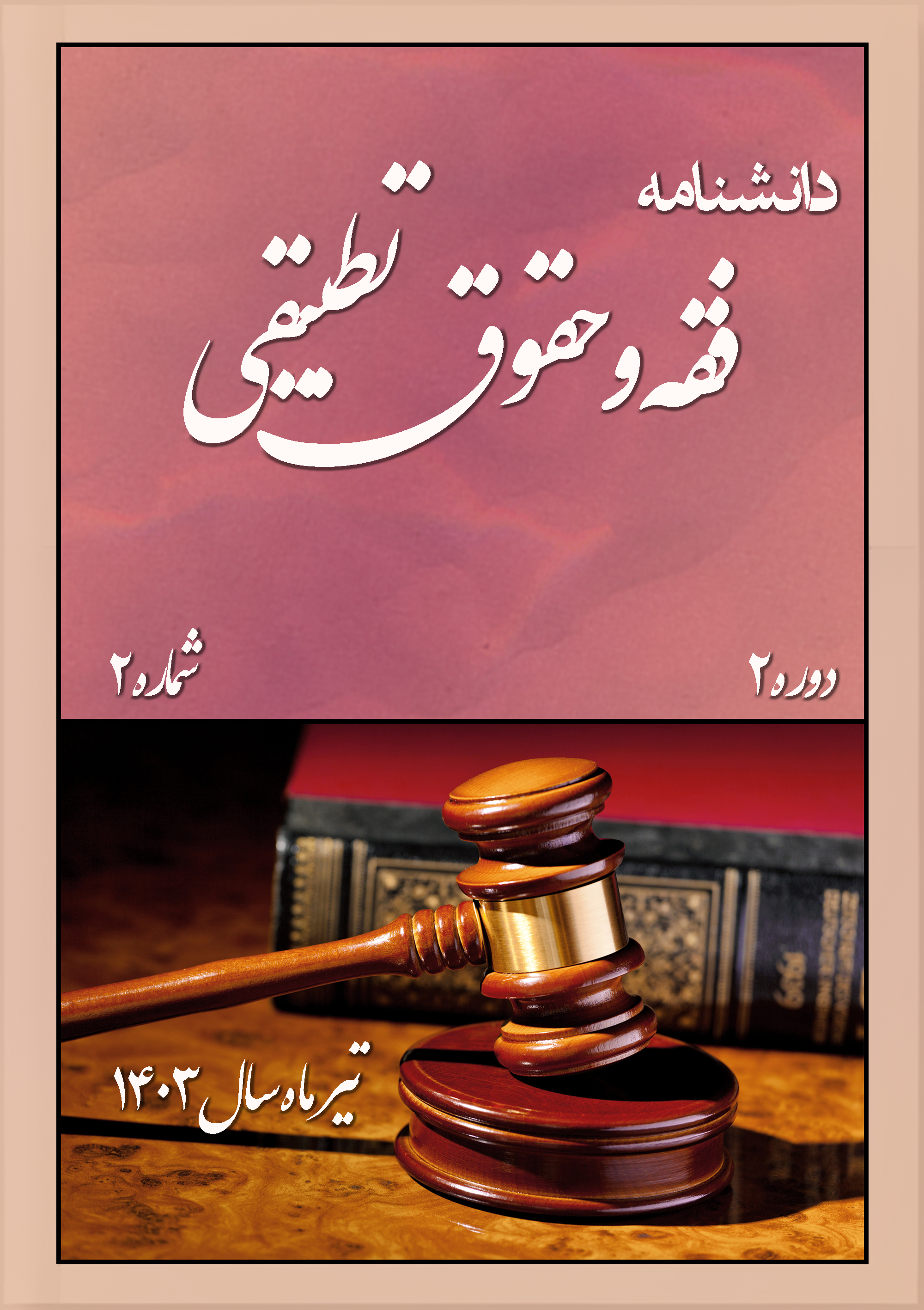The Foundation of the Disruption of the Principle of Contractual Binding (Asālat al-Luzūm) in the Assumed Absence of Conventional Equilibrium of Considerations in Iranian Law and Islamic Jurisprudence
Keywords:
option (khiyār), lesion (ghabn), lā ḍarar (no harm), implied conditionAbstract
The principle of contractual binding and the non-dissolution of contracts—referred to as Asālat al-Luzūm—is among the general principles governing all contracts, and it remains effective except in cases where it has been specifically limited by the legislator. One of the notable exceptions to this principle, which leads to the instability of contracts, is the disturbance in the balance of the value of mutual considerations (ʿiwaḍayn). The question of what constitutes the rationale and foundation for deviation from the principle of binding force of contracts, in cases where the equivalence of considerations is absent, remains unanswered with precision and comprehensiveness despite its significant importance and profound implications in resolving contractual disputes. The prevention of unjust harm (nafy al-ḍarar al-nārwā) and the negation of coercion (nafy al-ikrāh) are among the well-known bases advanced by most Imami jurists and legal scholars to justify the removal of contractual binding in such cases. In the jurisprudence of Sunni schools, those who have recognized the option of ghabn (option of lesion) as a legitimate basis have either failed to specify a theoretical foundation for it or have relied on the aforementioned principles. In the present study, the authors critically examine the above-mentioned views, refuting each with reasoned arguments, and propose their own perspective grounded in the principle of "implied will and consent" (irādah wa tarāḍī ḍimnī), elaborating and clarifying its conceptual framework.
Downloads
References
Al-Jama'ili al-Hanbali, A. R. Al-Sharh al-Kabir ala Matn al-Muqni (Vol. 4).
Al-Qahtani al-Hanbali, A. R. (1986). Al-Ahkam Sharh Usul al-Ahkam (Vol. 3).
Al-Qurtubi al-Dhahiri, A. M. Al-Muhalla bi al-Athar (Vol. 7).
Al-Suyuti, J. a.-D. (1991). Al-Ashbah wa al-Naza'ir (Vol. Part 1).
Al-Umrani al-Yamani, Y. (2001). Al-Bayan (Vol. 5).
Al-Zuhayli, W. i. M. Al-Fiqh al-Islami wa Adillatuh (Islamic Jurisprudence and its Proofs) (Vol. 5).
Amili Karaki, A. (1994). Jami al-Maqasid fi Sharh al-Qawa'id (Vol. 4 & 6).
Ansari, S. M. (1994). Jurisprudential Treatises.
Ansari, S. M. (1995). Al-Makasib (Vol. 5).
Ardabili, A. (1983). Majma al-Faidah wa al-Burhan fi Sharh Irshad al-Adhhan (Vol. 8).
Bahrami Ahmadi, H. (2011). Rules of Jurisprudence (La Darar - No Harm) (Vol. 2).
Bahrani, Y. (1985). Al-Hada'iq al-Nadhirah fi Ahkam al-Itrat al-Tahirah (Vol. 18).
Behbahani, M. B. (1997). Marginalia on Majma al-Faidah wa al-Burhan.
Bujnourdi, S. H. (1999). Rules of Jurisprudence (Vol. 1).
Esmaeili, M. (2011). Tacit Stipulation (Shart-e Ertikazi) in Imami Jurisprudence and Iranian Law.
Fesharaki, S. M. (1993). Al-Rasa'il.
Golpaygani, S. M. R. (1970). Mukhtasar al-Ahkam.
Hakim, S. M. Nahj al-Faqahah.
Hakim, S. M. (1996). Mustamsak al-Urwah al-Wuthqa (Vol. 4).
Hilli, A. (1993). Tadhkirat al-Fuqaha Hadithah (Vol. 11).
Himyari, N. (2000). Shams al-Ulum wa Dawa' Kalam al-Arab min al-Kulum (Vol. 6).
Ibn Manzur. (1993). Lisan al-Arab (Vol. 4).
Ibn Qayyim al-Jawziyya, S. a.-D. (1991). I'lam al-Muwaqqi'in an Rabb al-Alamin (Vol. Part 3).
Ibn Zuhra Halabi, H. (1997). Ghunyat al-Nuzou ila Ilmay al-Usul wa al-Furu.
Irwani, B. (2005). Introductory Lessons in the Rules of Jurisprudence (Durus Tamhidiyyah fi al-Qawa'id al-Fiqhiyyah) (Vol. 1 & 2).
Jafari Langroudi, M. (2013). Wasit in Legal Terminology.
Jawhari, I. (1990). Al-Sihah (Vol. 2).
Kashif al-Ghita, M. H. (1939). Tahrir al-Majallah (Vol. 1).
Katouzian, N. (2008). General Rules of Contracts (Vol. 5 Volumes).
Khansari, S. A. (1985). Jami al-Madarik fi Sharh Mukhtasar al-Nafi (Vol. 3).
Khomeini, S. R. (1963). Tahdhib al-Usul (Vol. 2 & 3).
Khomeini, S. R. (2000). Kitab al-Bay' (Vol. 5 Volumes).
Khorasani, A. M. K. (1989). Kifayat al-Usul.
Khorasani, A. M. K. (1993). Kitab fi al-Waqf.
Khui, S. A. Misbah al-Faqahah (Vol. 3-7).
Khui, S. A. (1998a). Fiqh al-Shi'a (Kitab al-Taharah - Book on Purity) (Vol. 2).
Khui, S. A. (1998b). Mawsu'at al-Imam al-Khui (Vol. 31).
Makarem Shirazi, N. (2006). Encyclopedia of Comparative Jurisprudence.
Mamaghani, M. A. (1900). Ghayat al-Amal fi Sharh Kitab al-Makasib (Vol. 1).
Mamaghani, M. A. (1931). Nihayat al-Maqal fi Takmilat Ghayat al-Amal.
Maraghi, S. M. A. F. (1997). Al-Anawin al-Fiqhiyyah (Vol. 1).
Mohaghegh Damad, S. M. (1986). Rules of Jurisprudence (Civil Section) (Vol. 4 Volumes).
Muzaffar, M. R. Hashiyat al-Muzaffar ala al-Makasib (Vol. 2).
Na'ini, M. M. H. (1954). Munyat al-Talib fi Hashiyat al-Makasib (Vol. 1).
Najafi, M. H. (1984). Jawahir al-Kalam (Vol. 22 & 23).
Naraqi, M. A. (1997). Awa'id al-Ayyam.
Ruhani, S. S. (1992). Fiqh al-Sadiq (peace be upon him) (Vol. 16).
Sabzewari, M. (2002). Kifayat al-Ahkam (Vol. 1).
Safaei, H. (2007). General Rules of Contracts.
Sarakhsi, M. (1994). Al-Mabsut (Vol. 6).
Shahidi, M. (2008). Stipulations within a Contract.
Sheikh al-Shari'ah Isfahani, F. (1990). Rule of La Darar (No Harm).
Sistani, S. A. (1994). Rule of La Darar wa La Dirar (No Harm and No Infliction of Harm).
Tabatabaei, A. i. M. (1997). Riyadh al-Masa'il fi Tahqiq al-Ahkam bi al-Dala'il (Vol. 2 & 8).
Tabrizi, M. J. (1996). Irshad al-Matalib ila al-Ta'liq ala al-Makasib (Vol. 3 & 4).
Turayhi, F. a.-D. (1996). Majma al-Bahrain (Vol. 3).
Tusi, A. J. f. (1987). Al-Khilaf (Vol. 3).
Yazdi, S. M. K. (2000). Hashiyat al-Makasib (Vol. 2).
Zabidi, M. (1993). Taj al-Arus (Vol. 6).
Downloads
Published
Submitted
Revised
Accepted
Issue
Section
License
Copyright (c) 1403 میثم شکوهی; حجت الاسلام محمد حسین بیاتی (نویسنده)

This work is licensed under a Creative Commons Attribution-NonCommercial 4.0 International License.










